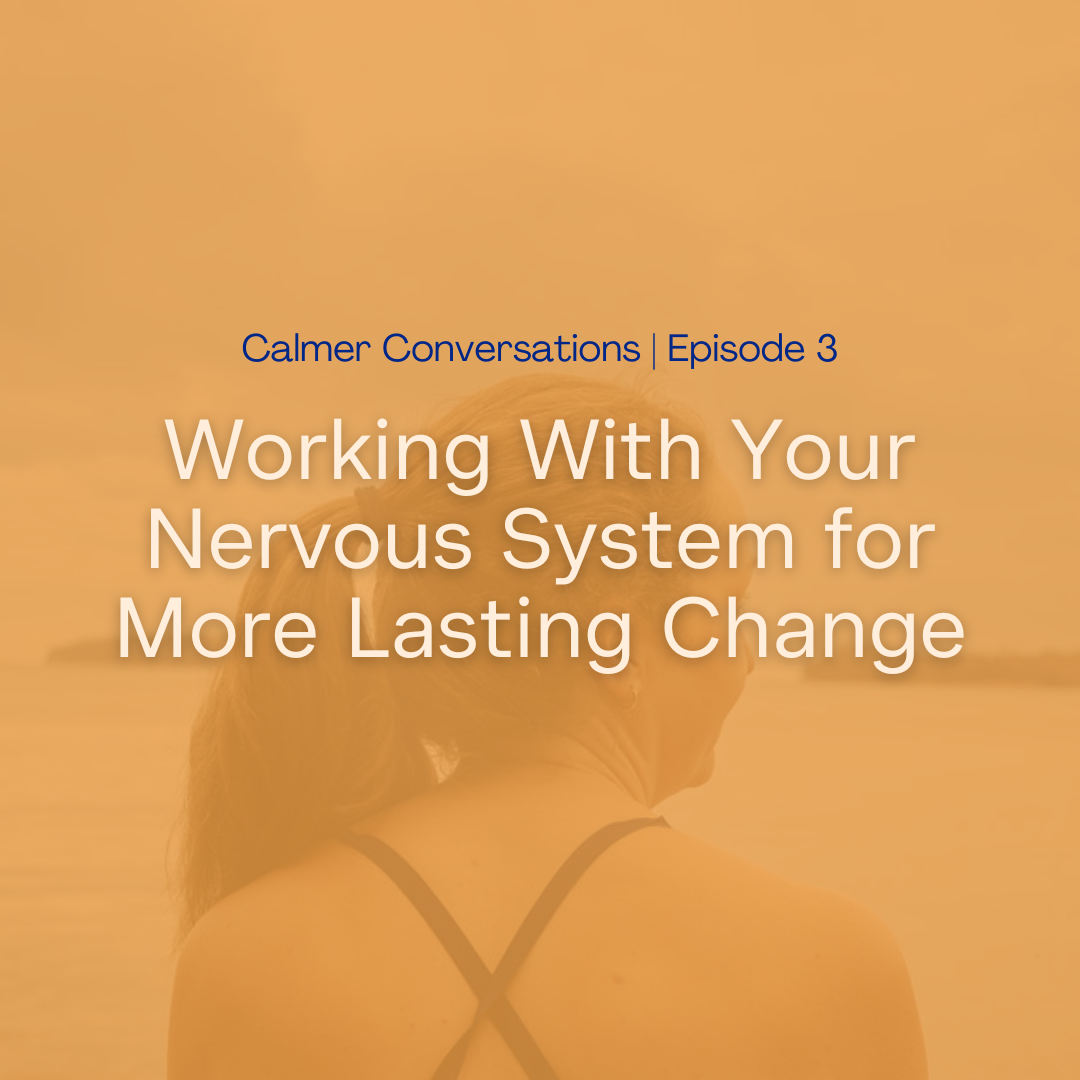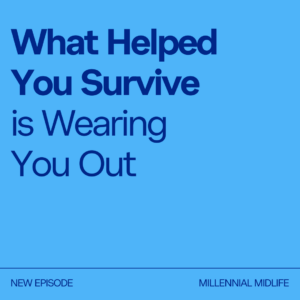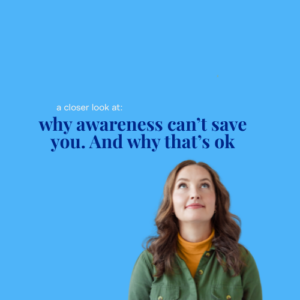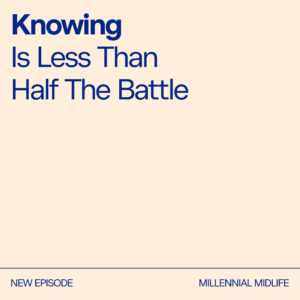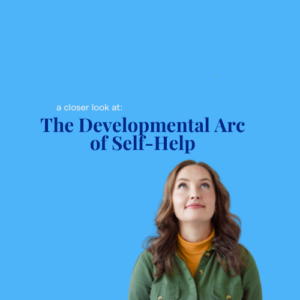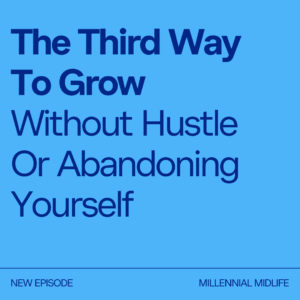Cecelia Baum Mandryk (00:01.902)
Hi and welcome to episode number three of Calmer Conversations. I’m Cecilia. Let’s get started. Today our topic is your nervous system and why it matters. If you were even tangentially interested in personal growth, which I’m guessing you probably are if you’re here, you’ve likely heard about your nervous system and nervous system regulation. And if you can think back to science class, no matter how long ago that was, you’re probably aware that you have a thing called a nervous system.
and it’s related to states like fight or flight. And if you can’t even remember that, honestly, it doesn’t really matter. Mostly you just need to be a human here today to get something out of today’s episode, which is again, all about your nervous system and why paying attention to it and working with it matters for making lasting change in your life and how you feel day to day, minute to minute. A lot of personal growth focuses on mindset
That is understanding and working with the thoughts that you have. And that’s really honestly very huge, important life -changing work. It’s a big part of what I do. It’s what we’ve talked about on the first two episodes, working with and understanding your brain. But here’s the thing. I don’t actually think that you can make a real lasting change unless you also address your nervous system. Our nervous system is so crucial. And you’re gonna see after today’s episode in driving, how you act, what you think.
how you are day to day, that if you don’t actually work with it, it’s very hard and it’s you’re kind of fighting an uphill battle if you’re only working with your thoughts. Okay, so you can do all of the mindset work in the world and it won’t make a huge difference if your nervous system isn’t regulated or it doesn’t like to stay in a regulated state, which is something that a lot of other people don’t talk about, right? So it has to have a safe home base, but it also has to like coming back to that home base.
This is why in the work that I do, I combine mindset and mindfulness, or you could think of it like cognitive science and nervous system regulation or thought work and yogic wisdom to support you and your whole being as you make changes and to make sure that those changes stick. In the past two episodes, we’ve addressed your brain. So before we get too far into this podcast, I thought it was important to spend some time with the nervous system. After today’s episode, you’re gonna walk away with some background information on your nervous system.
Cecelia Baum Mandryk (02:21.506)
why your nervous system matters to you in your life. And then in a later episode, you’ll learn about your nervous system defaults how to start changing those. So with all the episodes, I hope this one brings some relief, provides some possibility for change, gives you some tips on how to kind of maybe even just work with yourself. As with all episodes, I hope this one brings some relief, provides some possibility or hope for change, and also helps you see how starting
bring awareness to what’s happening in your body is actually one of the keys to starting the change. Also, you’re not alone. What’s happening in your nervous system is happening for a lot of other people. You’re not broken. There’s just a piece of you that you never really learned to work with or care for that matters greatly in your day -to -day life. All right, so let’s dive into the content. First, I also want to say that I’m approaching this from a coaching perspective and not as a neuroscientist. So this is a simplified approach.
You’re not here to pass an anatomy or physiology test. You’re here to learn about you and why this matters if you want to feel different or make changes in your life. You can think of your nervous system as your brain or parts of your brain, your spinal cord, and a whole bunch of nerve fibers that travel throughout your body sending and receiving messages. Within your nervous system, you have the autonomic nervous system and the somatic system.
The somatic nervous system involves things that you can consciously sense and do. So if you think about raising your arm or you think about looking at your watch and moving your arm to do that, the autonomic nervous system is a control system that acts largely unconsciously and regulate your bodily functions. We are primarily focusing on the autonomic nervous system today. This system is always on and it regulates things like heart rate, blood pressure, respiration, digestion, sexual arousal.
It regulates everything that you do. And most importantly for this conversation, it’s always scanning your body, your environment, and relational cues from people around you for signs of safety and danger. Your nervous system is part of your safety defense system, and it is crucial for your survival. All of this safety danger stuff and your autonomic nervous system is happening behind the scenes, right? So you’re not having to tell your nervous system
Cecelia Baum Mandryk (04:37.912)
that things are different and it should adjust your pupil dilation or your blood pressure. It’s doing this without you noticing, right, with you actually not interacting consciously. So it notices that look on your boss’s face and it makes an interpretation or if it’s sensing unusual heat through your skin or sees a rope at dusk and you think it’s a snake, you might jump or you smell the comforting smell of your favorite food. It’s all reacting to these things.
It’s always adjusting. It’s always saying you’re safe or you’re in danger. So it’s assigning you to one of two states, that safety or danger. At this point, I think it’s helpful to know that your nervous system is really amazing and complex, and it isn’t really great at differentiating between a five alarm fire in the moment and the time you burned your toast three years ago. That is, it really only knows those two states, danger or safe, and it doesn’t have a concept of time.
So this is sort of by design, right? If you think back to the time when humans lived in caves or even just walking down the street, danger is danger, right? It doesn’t make a lot of sense in the moment to figure out more because survival is the most important thing. If you think about that rope in the dark, it doesn’t make sense to stick around and see, it really a snake? And is it a poisonous snake or is it a snake that can hurt me? It really just makes sense to respond because your survival might depend on it, right? And
doing something is more important than not doing something. However, in today’s world and for you, it means that your nervous system reacts pretty similarly to things like the fear of getting hit by a bus when you’re crossing the street if you see one coming toward you quickly and receiving an email from your CEO. It puts both of those perhaps in the danger case and you have a very similar reaction.
you do have a part of your brain that differentiates between these two things and also differentiates between the levels of danger at your prefrontal cortex, your frontal lobe, but it’s slower and it makes it slower, right? And it uses more energy. It has a concept of time, but in the moment of danger or in the moment actually of action. So in the present moment, it has less influence. So your primitive brain and your nervous system, your autonomic nervous system have more pull and power in the moment.
Cecelia Baum Mandryk (06:53.71)
than your thinking brain, your cognitive brain, your higher self, however you wanna think about that. I think this is a really important point. And honestly, if you just take this away from the episode, it might be life -changing because in the moment of action, a different part of your brain is making a decision than the part of your brain that makes decisions thinking about your future. This is a quick aside, but for instance, if you really want to go running at 6 a .m.,
And you know that you want to go running because you signed up for this race with a friend and you really want to change your fitness and you actually love getting out of the door and moving your body. It all sounds really great ahead of time. Great. That’s your cognitive brain or your higher self thinking about goals, thinking about who you’re becoming, thinking about the impact of this. But then in the moment, your primitive brain and your autonomic nervous system take over. So your alarm goes off at 6 a .m. and this part of your brain really wants to conserve energy.
It really wants to avoid danger and it really wants to seek out pleasure. And so it thinks going for a run at 6 a .m. is a terrible idea. And that’s why something can feel so powerful and compelling and really amazing ahead of time. And in the moment, it’s really hard to act on
So honestly, take this away and use that. Just know, in the moment, there’s a different part of my brain that’s in charge. Once you bring your awareness to this and you can work with it, you can do a lot of different things. Again, without using willpower and self -discipline, just using wisdom and reconnecting to that higher self. Okay. So I also want to circle back around to what I said about to your nervous system and time, because if you ever notice that when you can be lying in bed, you can be drifting off and suddenly you’ll remember something that your colleague said earlier in the
Maybe it was a bit of criticism or feedback or maybe they pointed out a mistake that you made, something that activated or triggered you. And in that moment, you’re in bed, cognitively you know that you’re safe. Cognitively you know that you are not in danger in that moment. And you can feel your body flooded with adrenaline and cortisol. You can feel yourself get activated. You can actually like say, all right, I guess I’m not sleeping right now, right? You’re up and spinning and spiraling.
Cecelia Baum Mandryk (09:06.658)
So that’s what I mean when I say your nervous system, the autonomic part of your nervous system and the primitive part of your brain doesn’t have a sense of time and can’t really differentiate between what has actually just happened in the moment and what you’re thinking about, right? So you thought about this piece of criticism and it triggered you in the same way that happened in the moment. Again, this is really powerful to know, to know the power of your thoughts and know how your thoughts actually interact with your nervous
So your brain, that part of your brain and your nervous system, they don’t know about time, but they don’t also know about a thought about something versus the real thing. It’s reacting as if the danger is happening right now. Your nervous system says, you must be in danger. You’re thinking these thoughts. We have to protect you. And so then you start to get activated because your first line of defense is you get activated when you sense danger, right? The adrenaline starts going, your blood pressure changes, your pupils.
different things happen in your body physiologically. You stop digesting as well, honestly. And being asleep when you’re in danger isn’t usually a good idea. And so your brain isn’t going to let you sleep, right? It’s saying like, you need to get up, you need to do something about this. And very often the only thing that we do about something like that anyway, is we spiral in our head. And so that’s why you might lie awake thinking about something for a long time. So when you’re not in danger,
Sometimes what happens is your nervous system misreads these cues and gets activated and that you get assigned to the danger state that’s maybe not the most helpful for you in the moment. This state, the danger or safe state, determines how you perceive everything around you. How you interpret what your partner said, how you show up for your kids or your friends. It determines how you show up for the problems in your life and how your brain interprets that unfinished laundry or the grant you didn’t get or your full email inbox.
It impacts your capacity to celebrate, to rest, to grow, to show up as you. So your nervous system is extremely important in how you feel and who you are in your life. Right, so if you started this episode thinking like nervous system, blah, blah, blah, like I don’t think I need this. Just know that it impacts everything that you’re doing because it’s putting you in this safe or danger state. The cool thing, and I’m just gonna say this.
Cecelia Baum Mandryk (11:23.)
quickly now is that you can interact with it consciously even though it is a less conscious part of you. So is this starting to land? Is it starting to make sense why it’s important that you pay attention to your nervous system and you start to bring your awareness to what’s happening there? All right, if it is, you should say it is, again, this helps you to absorb the information that you’re hearing here instead of just have it be a passive learning exercise.
You might also start to maybe say to yourself right now, now I understand why I want to pay a little bit more attention to my nervous system. So here’s some other helpful things to know. Within your nervous system, your autonomic nervous system, there are two different kind of states. That’s the sympathetic and the parasympathetic. The sympathetic is usually called fight or flight. Now we’ve added freeze, fawn and flock. So all the F’s are over in the sympathetic state.
These are actions that different people might be predisposed to or responses people might be predisposed to when their nervous system assigns them to the danger state. So you might even right now pause and ask, when I feel like I’m in a danger state, which of those do I go to? Right, I might fawn, which means people please, or I might feel like I totally freeze or very often I get angry and want to fight, right? And so this knowing your own reaction can be really powerful and starting to work with
This is the predisposed state that your nervous system, when it assigns danger to you that you go to. It’s the hyper -aroused state where you might feel angrier or more defensive or on edge or like you really need somebody to like you or you really need to go into that people pleasing mode so that you will feel safe, right? If you spend a lot of time in this aroused state, your nervous system and endocrine system can get a little worn out and you can default into a
or conserving state. Your nervous system says, listen, we’ve tried to fight, we’ve tried to flee. We’re running out of steam here. We’ve got to shut down and conserve energy. And your body actually will shut down and conserve energy. This is like long -term and this actually turns into the bodily form of burnout. And if you go down, what you call, I like to call team hypo or the polyvagal theory calls it into the dorsal zone. So if you go down that hypo arousal state for a long
Cecelia Baum Mandryk (13:33.134)
The polyvagal theory calls this the dorsal zone. It’s the zone where you’re trying to conserve energy, where you feel kind of shut down. The parasympathetic nervous system, the autonomic nervous system and the parasympathetic response is associated with resting, digesting, creating, connecting, and cognitive thinking. Okay? And also change, honestly. So if you want to change,
If you want to have great digestion, if you want to be more creative, if you want to connect with yourself and others and think more cognitively, you need to spend more time in the parasympathetic response than in the sympathetic response. This is being assigned to the safe category and it allows you to be at your best. It allows you to be at your higher level of thinking, creating, being with loved ones and loving yourself.
If you do have digestive issues, this can also help relieve those in some ways. It’s not a cure -all, but it can also help. This is when you’re curious, compassionate, switched on. It’s when you probably feel most like you, and it’s probably where you like to spend the most time. Related to this kind of sympathetic response and parasympathetic, or… Related to this sympathetic response and parasympathetic response is something called the zone of tolerance. And the polyvagal theory…
Your vagus nerve is the one that innervates your torso, by the way. I don’t think I mentioned this earlier. And it is the back and forth nerve between your brain and your body that is actually really crucial for working with your nervous system intentionally. And your zone of tolerance is the amount of stress that your nervous system can tolerate and still stay relatively regulated. So this is how much it can be happening around you and you still feel like calm and cool, or you still feel like you’re maybe in the safe zone.
This zone can grow or shrink depending on what’s happening in your life. And you can actually train it to expand. So then a zone of tolerance isn’t a static thing. It’s not something you were born with. But if you think about, if you’ve had a lot of really stressful things go on, or if you’ve had a couple years of really stressful things and it feels like I just don’t have a lot of tolerance, something really small can set you off. Right, so your zone can be smaller on day to day or year to year. It can also grow and you can work with it intentionally. When your
Cecelia Baum Mandryk (15:55.586)
Another fun fact is that your nervous system started developing when you were in utero. That means that whatever was happening in your birth parents life impacted you. So not just the epigenetics, but their reactions to movies they saw and work stress and work world events and the joy they got from ice cream, those all impact the formation of your nervous system and your regulated state or dysregulated state. Again, that doesn’t mean you can’t change it now, but it means that it impacted you as a person. And your nervous system continued and continues to be imprinted.
when you were a baby, when you were a small child, and yesterday. So in other words, your environment, both past and present, and your genetics impact your specific nervous system. But the really cool thing is, like your brain and the neural pathways that we’ve talked about, your nervous system is learning all the time, which also means that it can unlearn things and it can relearn things that aren’t helpful or working in its favor. So this part of your nervous system, the autonomic nervous system, is crucial for how you feel day to day and minute to minute. So I hope
that what I’ve given you so far has given you a taste of the nervous system, but also why it matters for how you react and how you feel, for instance, at work regularly or with friends or with loved ones. It’s not just what you’re thinking, but it’s what your nervous system is perceiving and what it has perceived in the past and it’s using for information to interpret what’s happening now. Most of us spend a lot of time in the sympathetic response. That’s the fight, flight, freeze, fall and
But if you want to feel calmer, happier, and more joyful in your life, if you want to make changes in your life, you have to spend more time in the regulated space and that parasympathetic response. Bear in the parasympathetic response, right? That’s the rest, digest, create, connect, cognitive thinking, and change. And this is why change can be so hard when your nervous system isn’t on board.
Right? So if you think about trying to make change from that sympathetic response, you’re generally in resistance to what’s happening around you, to the world. And really change is very hard there. It’s not accessible to you. Cognitive thinking is less accessible. Thinking creatively or acting creatively is less accessible. Connecting with yourself and others is less accessible. And so if you want to make all of those things feel easier and come more naturally to you, one of the easiest ways to do it is to start by working with your nervous system. So for you to learn and change,
Cecelia Baum Mandryk (18:16.94)
your nervous system needs to relearn and change. And that means you need to consciously interact with your nervous system to train it to feel okay and safe in certain situations where it might not right now and to work with it. I don’t mean by gas, I don’t mean that to gaslight yourself, right? To force yourself to feel safe when you don’t actually feel safe, but to start to recognize when your nervous system is overinterpreting something or interpreting something in a way that isn’t helpful or supportive to you. It might’ve learned something in the past that was adaptive, but now is no
That’s why it’s important for you to understand what is happening in your nervous system and state the baseline, right? And also get curious about where do I want it to be? How do I want it to be? How would I like it to be different? Okay, so then how do you actually get there? Right? That might be coming up for you if you’ve gotten this far. The first is to just become aware, right? To notice, I feel like I’m in danger right now. I can notice that my pulse is elevated. I notice that
I’m kind of, my brain is telling me that things are maybe a little more dangerous than they might actually be. And I’m not going to go into it in depth in this episode, but there are several ways that you can work with your nervous system using that vagus nerve that I mentioned earlier to get to a more regulated state more often to expand that zone of tolerance and to start to allow your nervous system to feel safe in that home base.
Okay, the three that I love the most and that I use in my coaching groups each month are guided meditation, is I use I rest yoga nidra, if you’re familiar with that, which is we’re working through understanding what’s happening in your body and your breath and your brain and kind of playing around with you being the person who is aware of what’s happening. Coherent breathing, which is slow diaphragmatic nasal breathing, thinking about five and a half breaths per minute.
and gentle movements, which you might think of restorative yoga or gentle somatic movements. These three things I think are so powerful at helping your nervous system process backlogs of emotions, but also get to regulation now and expand your zone of tolerance. All right, so there are a big takeaways in here. You might just take a moment and pause and think about what you’re taking away from this episode and what you think might be most impactful for your
Cecelia Baum Mandryk (20:36.814)
But really understanding that the nervous system is a huge component in how you feel each day and what you do. And if you want to make change and you want to feel differently in your life, you probably want to start paying attention to your nervous system in some way. You want to start to pay attention to where it stays day to day, to what’s happening in it, and then start to ask yourself, how do I want to, what sounds like a fun way for me to start to regulate it more and spend more time in that space? We’ll go more into depth in more episodes.
I just wanted to make sure that you had this kind of level of understanding and you really, instead of just thinking of the nervous system as like, right, I should pay attention to it. You really understand what’s at stake for you. All right, thanks so much for tuning in and I will talk to you next time.

